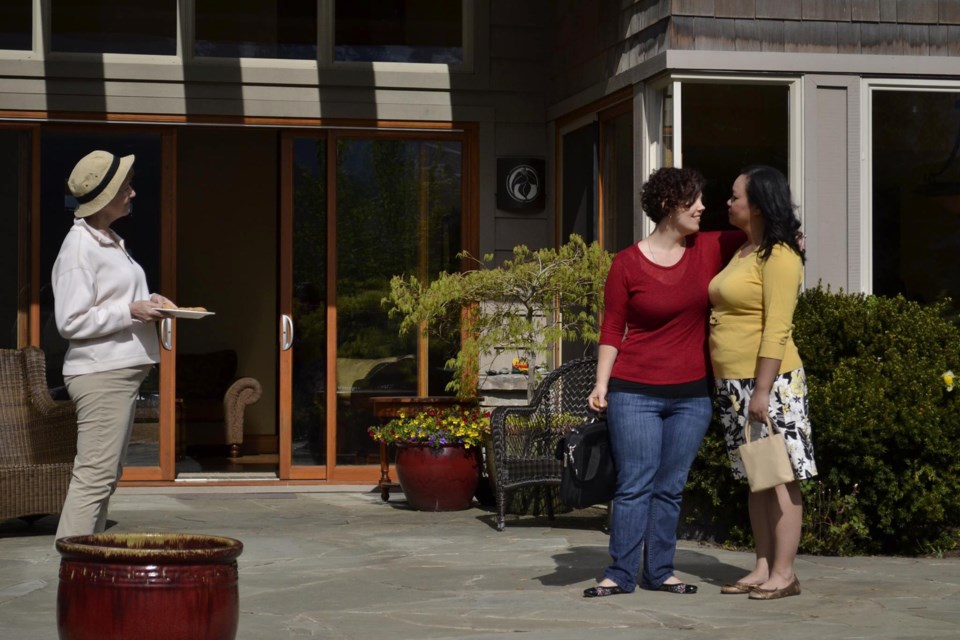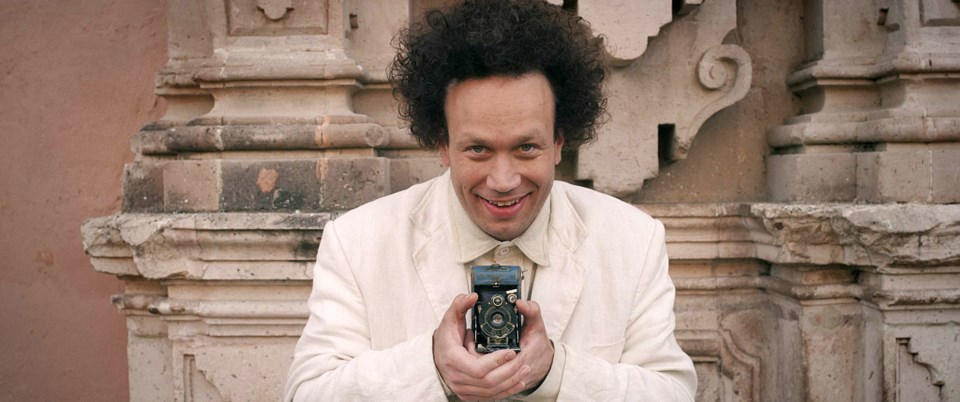As far as blanket terms go, “queer” is a biggie.
The word carries with it a multitude of people and life experiences, and the Vancouver Queer Film Festival (VQFF) dives to the very heart of this multi-faceted word with one helluva screening schedule.
How “helluva”? They’ve got stories and scripts that explore the spectrum, diversity, beauty, and challenges of the LGBTQ rainbow.
They’ve got musicals, documentaries, psychodramas, comedies, and horror (including Lyle, selected by Buzzfeed as one of the best horror films of 2014).
They’ve got 70 films from 21 countries over 11 days.
They’ve got panels, performances, galas, and discussions.
They’ve got popcorn. Oh, and they’ve got a youth-oriented roller derby event in there, too.
Over the course of its 27 years, the VQFF has grown from a small group of friends screening films for each other into the second largest film fest in the city (only the juggernaut Vancouver International Film Festival is bigger), and the largest queer arts event in Western Canada.
This year’s VQFF – which runs Aug. 13-23 – features spotlights on Latin American and Canadian cinema (the latter – entitled Maple Smoked Cinema – includes an archival program that whisks audiences through 70 years of Canadian queer film), gender-bending heroes (DIY Gender), and what’s billed as a “whack” of youth-rated films.
VQFF gives independent filmmakers from across the globe a supportive forum in which to share their queer stories, says David C. Jones, a Vancouver-based filmmaker whose musical short, Same Boat (Aug. 14 at the Rio Theatre; part of the Coast is Queer shorts screening), will premiere at the VQFF.
Jones probably wouldn’t be a prolific filmmaker today were it not for the VQFF.
An in-demand actor, teacher, writer, theatre artist, and emcee, Jones had hosted a couple of VQFF fundraisers when, after being gifted with a couple of all-access passes, he was inspired to dive into the dizzying world of filmmaking.
To date, nine of his shorts have played at the VQFF (“I’ve made more than nine, but nine of them have played at the Queer Film Festival. I have two heterosexual films floating around out there”).
Jones learned filmmaking by doing it. His oeuvre includes impressionistic dramas, black comedy (like 2011’s Coffee Club, about “people who take themselves way too seriously as gay people that they take queer-bashing as a symbol of their gayness”), and documentaries. He was one of four filmmakers chosen from across Canada to be part of a reality TV show called Hot Pink Shorts.
One of his previous VQFF films – 2011’s Laughing Behind Enemy Lines – highlighted the unintended activism of female impersonators in Vancouver from 1950 and well into ’80s.
“Some of my films have been for queer audiences,” says Jones. “Some of them have been for straight audiences to show them what the queer story can be.”

Same Boat is his first attempt at a movie musical, and his first VQFF entry where the protagonist isn’t LGBTQ, but a straight woman (portrayed by Anna Hagan).
The story is inspired by Jones’ late mother, who he describes as having lost the will to live after being abandoned by her husband.
“I’m getting older, and I started reflecting on that. And I went, ‘What could my mom had done had she not just given up?’ And that’s when I started cooking up the story,” says Jones. “I wanted to do something unique, and I wanted something about an older woman who’s in a loveless relationship, and I wanted it to be realistic.”
The catalyst for change in this woman’s life comes in the form of two lesbians, played by veteran theatre actresses Jennifer Suratos and Cathy Wilmot, who are introduced in the film by way of the line which is also emblazoned on the film’s poster: “It started out a typical day, then the musical lesbians arrived.”
These particular characters communicate only in bursts of song.
“One of the things I was thinking about was I wanted LGBT content that wasn’t the focus, but was the catalyst,” says Jones, who was recently honoured for his contributions to the arts at the third annual Vancouver Pride Legacy Awards and will soon be seen in OUTtv’s upcoming transgender comedy, The Switch.
“There are only so many coming-out stories that you can see, so I was thinking, ‘How else can I do LGBT content that’s not a coming-out story or a struggle story?’”
No spoilers, but the end result includes at least 13 original musical numbers, a row boat, and one final epic shot involving a crane and a marching band.
“We are all human. We are all the same, but we also are all different,” says Jones. “That’s why there’s a Jewish film festival. That’s why there’s a Latino film festival. There are things that unite us, but there are also things that make us unique.”
That theme of pride in uniqueness is present in Bearded Ladies: The photography of Rosamond Norbury (Aug. 18 at Vancity Theatre), a feature-length documentary by Vancouver filmmaker Sharon McGowan that will premiere at the VQFF.
Norbury has been an important figure on the local and national photography scenes for decades, revered for her images of homoerotic cowboys and drag queens.
McGowan’s documentary explores Norbury’s omnisexuality, and follows the celebrated camera-slinger as she prepares for an exhibit as part of the Queer Arts Festival’s Random Acts of Queerness show – an exhibit for which she photographed female subjects as their male alter egos, complete with beards and mustaches.
Viewers are also introduced to Norbury’s own alter egos: Rod Bush, the greaser gay boy (who we see hanging out with friends in Dude Chilling Park; “A lot of people were just staring, nodding, or shaking their heads,” says McGowan), and Rose Bush, the flourishing queen.
Norbury’s story pulls back the curtain on omnisexuality and gender fluidity, worlds and concepts that are still largely misunderstood, says McGowan, who co-produced 1999’s critically acclaimed lesbian drama, Better than Chocolate (which also screened at VQFF and employed Norbury as its stills photographer).
“I have always felt that Rosamond was a really positive role model for gender fluidity, in the sense that we are all a little bit of everything and that we need to be very open and accepting of people having different gender expressions,” says McGowan.
“As she says, what she does is playful, but it’s also kind of a wonderful introduction for people to this world and to this concept.”
McGowan’s favourite moments were shot on the day of the Bearded Ladies photo shoot, which also happened to be the first day of filming.
“The women were so open and so multifaceted and interesting in their approaches,” recalls McGowan. “I remember thinking, ‘This is pure documentary gold.’”
“I always feel on any documentary that your primary goal is to do no harm to the people’s story you want to tell, and to try to advance the dialogue that they’re struggling with or that they’re trying to communicate as positively as possible,” adds McGowan. “That’s my personal approach.”
Jones and McGowan aren’t the only Vancouver filmmakers screening work at the VQFF. The lengthy list includes Paula Stromberg (Family is Like Skin - Lesbians in Cambodia), Nick Citton (The Future Perfect), Stephen Emery (Venus Rises: The Story of Wiggle), Jackie Hoffart (Kiss and Tell), Krista Martin (The Right to be Heard), Cameron Masterton (Phagocytic Discipline), Anna Ngo (Dissonance), Clark Nikolai (Antisocial Networking), Alysha Seriani (Soak), Jonathan MacPherson (Boy Meets Boy), Shannon Kohli (The Out-Laws), Jason Karman (I Really Like You), and Wes Chew (Polarity).
• For tickets and full screening information, visit QueerFilmFestival.ca.
Festival Hot Tickets
Eisenstein in Guanajuato
“The greatest film practitioner we’ve ever seen” is how Peter Greenaway refers to Sergei Eisenstein, the 20th century creator of the masterpieces Battleship Potemkin and October. Here, Greenaway offers us his own sumptuous rendition of the director’s 1931 trip to Mexico to shoot Que Viva México, which was never completed after Eisenstein fell in love – and into distraction – with his appointed guide, Palomino Cañedo. High camp treatment blends with masterfully-shot scenes of Eisenstein rolling in luxurious beds, vomiting in alleyways, and cavorting with Frida Kahlo. And likely the best sex scene ever committed to celluloid that blends seduction and dominance with a turning-the-tables soliloquy on self-determination and colonialism – and a gorgeous drop of olive oil. Irreverently spanning the themes of queer lives, art, and sacrifice in the name of love and nation, Greenaway offers a middle pointer to contemporary homophobia and state control (especially in the direction of the Russian state that prides itself on Eisenstein’s legacy). To quote the Eisenstein of the film: “I came to Mexico a virgin and I leave it debauched… someone has opened a door to a wet and weeping, dirty hurricane.”
• Thursday, Aug. 13, 7pm, Vancouver Playhouse
• Saturday, Aug. 22, 4:30pm, International Village
Grandma
Lily Tomlin fans, rejoice! She’s clearly having a ball in Grandma, a rousing, exhilarating joyride that brings limitless energy and a decidedly un-Hollywood approach to storytelling about three generations of women. Here, the carefree feminist plot reveals itself early when Elle’s (Lily Tomlin) granddaughter Sage shows up on her doorstep seeking $600 for an abortion. Neither of them has the money so they set out on a road trip (in Tomlin’s own 1955 Dodge Royal) to get it without involving Sage’s mom, Judy (Marcia Gay Harden). Their journey sparks new life in Elle, a self-described misanthrope who’s been grieving the loss of her long-term love. Watch for supporting performances by the wonderful Laverne Cox, Judy Greer, and Sam Elliott too.
• Friday, Aug. 14, 9:00pm, Rio Theatre
In The Turn
Effervescent with hope, In the Turn centres on 10-year-old Crystal in Timmins, Ontario, whose experience of chilling social isolation and bullying at school begins to change once she finds friendship and community in the Vagine Regime. They’re a kick-ass international queer roller derby team that (unlike Crystal’s school sports teams) is trans-inclusive, and they welcome Crystal with open arms. As organizer Alex Krosney describes it: “Imagine spending your entire life keeping quiet about a huge part of yourself, then suddenly literally tumbling into a community of people who shout so loud about it that you can’t keep it down.” The film pivots to the experiences of the grassroots community that is the Vagine Regime and how members reach out to support Crystal. This heart-tugging documentary demonstrates how a small but mighty group are lead jammers in the movement for trans-inclusive policies in sport. The VQFF will be hosting director Erica Tremblay, Crystal and her mother Karen as special guests for this Vancouver premiere of one of the most buzzed-about films of the year.
• Saturday, Aug. 15, 6:45pm, SFU Goldcorp Centre for the Arts (Woodward’s)
• Thursday, Aug. 20, 9:15pm, SFU Goldcorp Centre for the Arts (Woodward’s)
The Cult of JT Leroy
The infamous writer who sparked “the postmodern trial of the century”, JT LeRoy, a 15-year-old transgendered sex worker, was hailed for writing heartwrenching novels. Chuck Palahniuk described LeRoy as having the “authentic voice of someone who suffers.” Known for being deeply shy, LeRoy was encircled by a Warholian world of celebrities including Winona Ryder, Rosario Dawson, Natasha Lyonne, Sandra Bernhard, Gus Van Sant, Shirley Manson, Lou Reed and numerous writers and agents. But at the peak of LeRoy’s 10-year rise came a rapid fall from grace. Says writer Dennis Cooper in the film, “From the beginning, I thought JT LeRoy was a liar… but I thought I knew when the lies were happening.” Was this the world’s largest literary scandal? Or a profound uncovering of our literary biases? Director Marjorie Sturm crafts a haunting, introspective documentary that questions artistic voice, freedom of speech and how far we will go to achieve our dreams.
• Saturday, Aug. 22, 6:50pm, International Village


